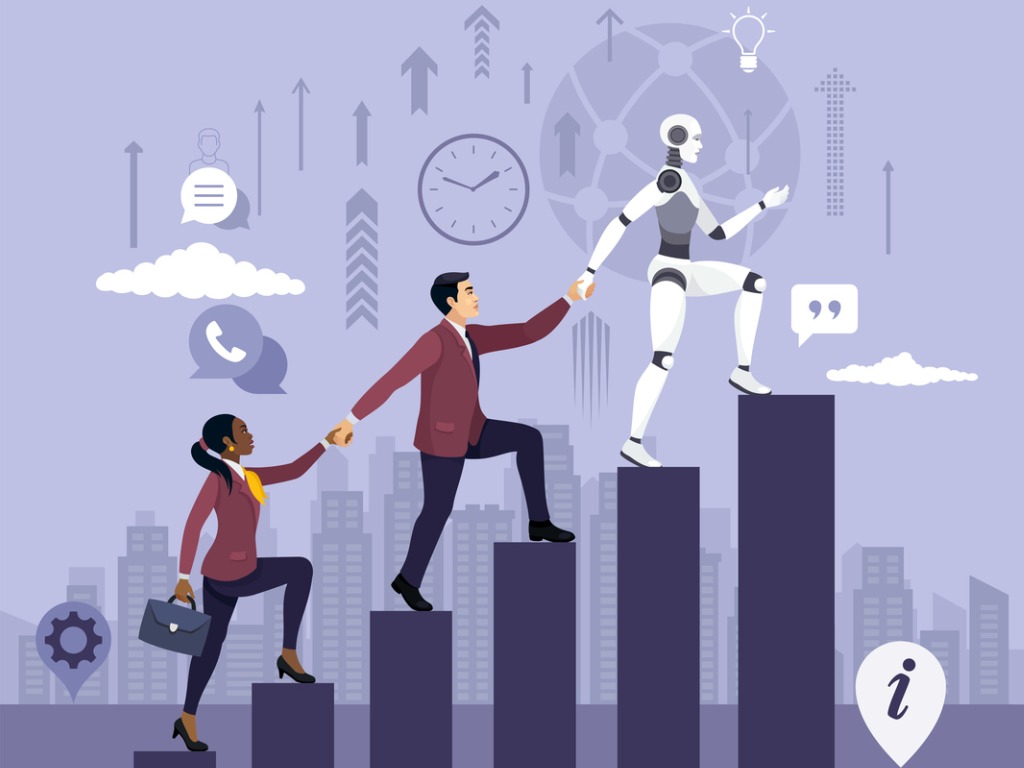
If history is any guide, AI will not lead to a job apocalypse but to a reconfiguration of work, explains Daniele Viappiani
Not a day goes by without some doom and gloom update on how artificial intelligence (AI) is coming after one or another profession. Administrative professionals are no exception, and in fact, AI is already being used to help streamline routine activities like helping compose emails, integrating with calendars to streamline operations, and providing support with scheduling and travel arrangements. But does this spell the end of the human Executive Assistant (EA)? Certainly not, just as it doesn’t spell the end of job creation for humans. AI is actually poised to create a whole range of new professions and improvements to existing ones.
AI continues to advance at an unprecedented pace, leading professionals across all industries to question whether they will be replaced by technology. Administrative professionals, in particular, are seeing AI-driven changes in their roles and have been among the first to integrate autonomous notetakers and tools to help summarize documents and meetings, for example.
Interestingly, although these seem like tasks that are ideal for automation, they immediately highlight the need for human intervention. People are needed to ensure the finished actions and notes are in the company’s house style and contain information that is really of use internally: it still takes human intelligence to understand the business, meeting, and corporate culture context to refine the documents AI prepares.
AI also still lags behind humans on many non-teachable features such as ethics, or flexibility and humour. In addition to this, as humans, we tend to prefer human interactions. That’s why many of us still buy coffee at a cafe when it’s just as easy to make it at home or to get it from a vending machine. My experience in tech innovation leads me to believe we will see new responsibilities and emerging roles in a set of major areas:
Operating AI Technology
For administrative professionals, this means becoming AI facilitators. EAs will increasingly leverage AI-powered scheduling assistants, automated transcription tools, and smart data analysis platforms. Those who learn to train AI to handle repetitive tasks – such as filtering emails, summarizing meetings, and optimizing workflows – will become indispensable.
High-Tech Office Management
As AI advances, office administration is becoming more data-driven and workflows more complex. AI-powered tools can analyse workplace efficiency, employee engagement, and resource allocation, giving office managers real-time insights to optimize operations.
Roles will emerge around AI-integrated office management, such as “AI-driven workflow specialists” who ensure that AI systems align with company goals. EAs will not only assist executives but also manage AI-powered dashboards that track key performance indicators, project timelines, and cross-functional collaboration.
Empowering Resource-Constrained Executive Teams
AI will help address administrative bottlenecks by automating repetitive tasks, allowing EAs to focus on strategic initiatives. Instead of spending hours scheduling meetings, they will use AI-driven tools that automatically find optimal meeting times based on participants’ calendars, time zones, and priorities.
Additionally, AI will improve travel planning, expense reporting, and document drafting. Executive support professionals will shift from task execution to decision support, offering insights based on AI-generated reports and analytics.
Jobs Induced by Cost Reductions
AI-driven efficiencies make business operations cheaper, increasing demand for skilled professionals who can leverage AI effectively.
For example, automated reporting tools will reduce the need for manual data entry, but professionals skilled in interpreting AI-generated insights will become more valuable. EAs who develop expertise in AI-assisted project management and data visualization will be able to decide which content should be translated (by AI) and ensure relevant content is provided to the right recipients.
A historical parallel is the banking sector: with ATMs handling withdrawals, human tellers shifted toward relationship-banking tasks – providing financial advice and managing customer relations. Similarly, AI will handle administrative grunt work, but EAs will move into strategic business partners.
Jobs Driven by New Executive Needs and Behaviours
Technology shifts executive workflows, creating unexpected job opportunities. Think of how marketing evolved to cover a broad umbrella of new professions, such as influencer and social media manager.
AI is changing how executives interact with their teams, clients, and data. Administrative professionals will increasingly serve as AI liaisons, ensuring that tools align with business goals and executive preferences. They may also take on roles as “AI-enhanced strategic coordinators,” using AI-generated insights to anticipate executive needs and optimize workflows. Finally, we may see a huge surge in demand for AI-savvy executives coming from both large corporates and smaller family businesses.
The AI Job Apocalypse
The AI job apocalypse has been predicted for years, yet it has not materialised. Interestingly, I have noticed that software engineers often have a pessimistic view of AI’s impact on jobs. A friend of mine, after being laid off by a major tech company, questioned whether it was even worth searching for a new job. This sentiment is not uncommon, as many professionals see AI automating certain tasks and wonder if their skills will remain relevant. However, as an economist, I share a more optimistic perspective.
While AI continues to advance at an unprecedented rate, history suggests that fears of mass technological unemployment may be overstated, especially when it comes to professional support figures. I have personally analyzed AI’s potential impact on employment while working for the UK government. Now, as a venture capital investor in technology companies, I continue to observe how AI is reshaping industries.
Concerns about machines replacing human labor are not new. The Luddite protests of the early 19th century saw textile workers smashing mechanized looms and knitting frames, fearing that their jobs were at risk. These fears have resurfaced throughout history, particularly during technological revolutions such as the Industrial Revolution, the rise of automation in factories, and the advent of computers. Yet, despite these disruptions, employment has consistently grown over the long term, and societies have become more prosperous.
One reason why the AI job apocalypse has not yet occurred is that humans are generally poor at predicting the long-term trajectory of technological change. For instance, the 1968 film 2001: A Space Odyssey depicted AI as an all-powerful entity capable of controlling humans. However, when the real year 2001 arrived, AI was nowhere near that level of sophistication. While AI has made significant strides in recent years – AlphaGo’s victory over a human Go champion being a prime example – its broader economic and social effects remain complex and multifaceted.
Conclusion
Throughout history, technological advancements have not only displaced some jobs but have also created new ones. AI is likely to follow this pattern by enabling new industries, increasing productivity, and generating demand for new types of work. The challenge lies in adapting to these changes – through upskilling, reskilling, and designing policies that support workers in transition. Rather than fearing AI’s impact on employment, we can focus on how to harness its potential. If history is any guide, AI will not lead to a job apocalypse but to a reconfiguration of work.
Mechanization, electrification, and the internet all disrupted industries but ultimately generated more jobs than they eliminated. AI follows the same trajectory. While concerns about job displacement are valid, history suggests that economic evolution leads to job creation in ways we cannot fully predict. By embracing AI’s potential and preparing for new opportunities, administrative professionals can harness its power to drive productivity and career growth rather than fear its impact.













